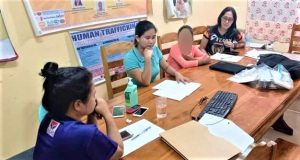Even with the lockdown, the strong quarantine protocols in place during this pandemic, Human trafficking has still a major problem in the country right now. Even with people trying to stay at home, there are still quite a number of reports of human trafficking cases happening, even within the home.
Human trafficking in its dictionary definition is a form of modern-day slavery involving the illegal transport of persons, either by force, or deception, where the victims end up being forced to work/labor, sexual exploitated/abused, or are forced to do activities in which others benefit financially.
Philippines has maintained its Tier 1 ranking in the 2019 Trafficking in persons report of the US Department for the fifth year in a row according to Immigration Commissioner Jaime Morente on an interview on July 31, 2020.

Tier 1 refers to the highest ranking indicating that a government has acknowledged the existence of human trafficking in their respective country, and that they have made efforts to address the problem, and complies with and follows the minimum standards of the Trafficking Victims Protection Reauthorization Act of 2017 (TVPA)
Through the maximum efforts of the government in combating human trafficking in our country, the Department of Social Welfare and Development (DSWD) Field Office Caraga, with the help of its partner agencies, already rescued thirty-three (33) individuals that were victims of the said felony in the region since the start of the pandemic.
Majority of the rescued individuals were minors and victims of Online Sexual Abuse and Exploitation on Children (OSAEC). This type of trafficking is the most crucial especially this time of pandemic wherein minors are constricted in going out the house because of the community quarantine mandated by the government.
Perpetrators have been lurking in the community in inviting children to get involved in OSAEC. Most of the suspects were neighbors or relatives of the victims. As the time spent on the internet has gone up, anyone who is using the world wide web and the social media is at risk and has a higher chance to have an engagement on the said type of human trafficking.
Aside from OSAEC, there are also other types of human trafficking known in our country, these are: trafficking for sex tourism, prostitution, pornography, forced labor, recruitment into armed conflict, smuggling of human organs, child labor, slavery, and so on.
DSWD FO Caraga is encouraging everyone to be more vigilant and active, and play a vital part in ending human trafficking not just in the region but for the whole country as well.###

